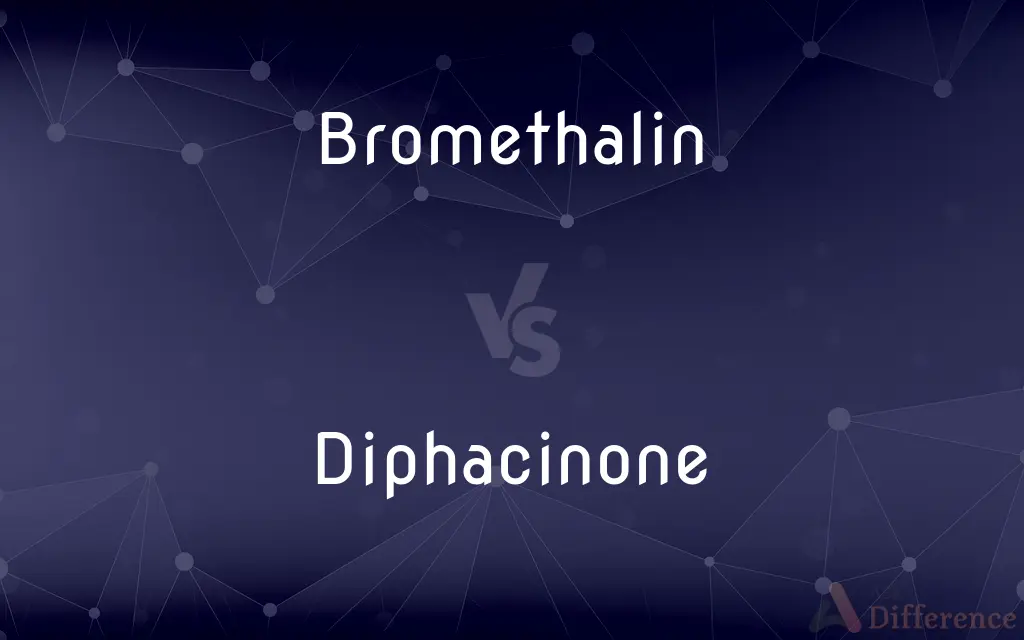Bromethalin vs. Diphacinone — What's the Difference?
By Tayyaba Rehman — Published on November 2, 2023
Bromethalin is a neurotoxic rodenticide, while Diphacinone is an anticoagulant rodenticide. Both are used to control rodent populations but function differently.

Difference Between Bromethalin and Diphacinone
Table of Contents
ADVERTISEMENT
Key Differences
Bromethalin and Diphacinone are both rodenticides, but they belong to different classes and have distinct modes of action. Bromethalin acts on the central nervous system of rodents, causing swelling in the brain, while Diphacinone inhibits the clotting mechanism in the blood.
When rodents ingest Bromethalin, they experience neurological symptoms, such as tremors and seizures, eventually leading to death. Conversely, rodents that consume Diphacinone bleed internally due to its anticoagulant properties, leading to their demise.
The efficacy of these rodenticides also varies. Bromethalin is fast-acting and may kill rodents within a day of consumption. In contrast, Diphacinone requires multiple feedings over several days to achieve a lethal dose, leading to a delayed effect.
In terms of safety, both rodenticides are toxic to non-target animals and humans. However, there's a notable difference in their antidotes. While Vitamin K1 can counteract the effects of Diphacinone, there's no specific antidote for Bromethalin poisoning, making it particularly dangerous.
Another key difference lies in their availability and usage. Bromethalin is often used when rodents show resistance to anticoagulant rodenticides like Diphacinone. Thus, while both are potent rodenticides, they cater to different scenarios and challenges in rodent control.
ADVERTISEMENT
Comparison Chart
Mode of Action
Neurotoxic
Anticoagulant
Symptoms in Rodents
Neurological symptoms like tremors and seizures
Internal bleeding
Efficacy
Fast-acting, kills within a day
Requires multiple feedings, delayed effect
Antidote
No specific antidote
Vitamin K1
Usage Scenarios
Used for rodent populations resistant to anticoagulants
Commonly used anticoagulant rodenticide
Compare with Definitions
Bromethalin
A fast-acting rodent control agent.
Rodent infestations can be quickly controlled with Bromethalin.
Diphacinone
An anticoagulant rodenticide.
Diphacinone inhibits the blood clotting mechanism in rodents.
Bromethalin
A poison that causes swelling in the brain.
Bromethalin leads to cerebral edema in affected rodents.
Diphacinone
A rodenticide requiring multiple feedings.
For lethal effects, rodents need to consume Diphacinone over several days.
Bromethalin
A neurotoxic rodenticide.
Rodents that ingest Bromethalin display neurological symptoms.
Diphacinone
A rodent control agent with Vitamin K1 as its antidote.
If ingested accidentally, Diphacinone poisoning can be countered with Vitamin K1.
Bromethalin
A rodenticide with no specific antidote.
In cases of accidental ingestion, Bromethalin poses a significant risk due to the lack of an antidote.
Diphacinone
A poison causing internal bleeding.
Rodents that consume Diphacinone suffer from prolonged internal bleeding.
Bromethalin
A solution for anticoagulant-resistant rodents.
When other rodenticides fail, Bromethalin offers an effective alternative.
Diphacinone
A commonly used rodenticide in pest control.
Many pest control agencies rely on Diphacinone for its proven effectiveness.
Bromethalin
A particular rodenticide.
Diphacinone
Synonym of diphenadione
Common Curiosities
Which rodenticide acts faster?
Bromethalin is fast-acting, killing rodents within a day.
Are there antidotes available for these rodenticides?
Vitamin K1 is an antidote for Diphacinone, but there's no specific antidote for Bromethalin.
Is Bromethalin safe for pets?
No, Bromethalin is toxic to pets and there's no specific antidote, making it particularly dangerous.
What type of rodenticide is Bromethalin?
Bromethalin is a neurotoxic rodenticide.
How does Diphacinone work to kill rodents?
Diphacinone works as an anticoagulant, causing internal bleeding.
Is Diphacinone effective immediately?
No, Diphacinone requires multiple feedings over days for a lethal effect.
Can Bromethalin be used for rodents resistant to other rodenticides?
Yes, Bromethalin is often used for rodent populations resistant to anticoagulants like Diphacinone.
What's the primary danger of Diphacinone to rodents?
Diphacinone causes prolonged internal bleeding in rodents.
What symptoms do rodents show after consuming Bromethalin?
Rodents display neurological symptoms like tremors and seizures after consuming Bromethalin.
How can Diphacinone poisoning be treated?
Diphacinone poisoning can be treated with Vitamin K1.
Share Your Discovery

Previous Comparison
IFSC Code vs. Branch Code
Next Comparison
Analyzing vs. EvaluatingAuthor Spotlight
Written by
Tayyaba RehmanTayyaba Rehman is a distinguished writer, currently serving as a primary contributor to askdifference.com. As a researcher in semantics and etymology, Tayyaba's passion for the complexity of languages and their distinctions has found a perfect home on the platform. Tayyaba delves into the intricacies of language, distinguishing between commonly confused words and phrases, thereby providing clarity for readers worldwide.













































